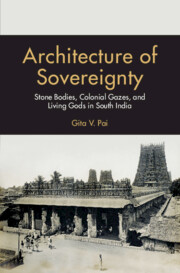Book contents
- Frontmatter
- Dedication
- Contents
- List of Figures
- Acknowledgments
- Notes on Transliteration and Spelling
- Introduction: Sovereignty’s Trace in Architectural Forms
- Part I Stone Bodies
- Part II Colonial Gazes
- Part III Living Gods
- Epilogue: Rejecting the State—Priestly Devotion and Protest in Modern Madurai
- Bibliography
- Index
4 - Tracing the Vernacular: Drawing Madura into Debates over Language in British India
Published online by Cambridge University Press: 19 April 2023
- Frontmatter
- Dedication
- Contents
- List of Figures
- Acknowledgments
- Notes on Transliteration and Spelling
- Introduction: Sovereignty’s Trace in Architectural Forms
- Part I Stone Bodies
- Part II Colonial Gazes
- Part III Living Gods
- Epilogue: Rejecting the State—Priestly Devotion and Protest in Modern Madurai
- Bibliography
- Index
Summary
Introduction
Thomas Daniell and his nephew William journeyed from England to India in 1786, hoping to profit from a British market hungry for depictions of life in the British colony. They traveled as itinerant artists and earned their living by rendering original, first-hand impressions of India. The Daniells published six volumes of aquatints for Oriental Scenery, presenting India pictorially to elite British residents and newly moneyed East India Company servants returning to London. Later, William Daniell took advantage of the booming nineteenth-century literary marketplace by converting the aquatints from Oriental Scenery into engravings for the Oriental Annual. The Oriental Annual was a mass-produced, moderately priced drawing-room annual, part of an early Victorian print culture that married part-fictional, part-historical travel narrative with exotic pictures, aimed at the literate middle class that emerged during Britain's industrial revolution. Volume II (1798) of Oriental Scenery and volume III (1836) of the Oriental Annual feature images and commentary about Madurai (which the British called “Madura”) and the Pudu Maṇḍapam (described as “choultry”).
Through the genre of British literary annuals, the small southern temple town of Madurai became entangled in imperial debates over the government of the British colony as a whole. William Daniell's engravings in the Oriental Annual featured the commentary of Hobart Caunter, a British cleric who claimed to have traveled with the Daniells; Caunter's notes accompanied images of Madurai and the Pudu Maṇḍapam, but they were addressed to a brewing debate over the medium of instruction in government-sponsored schools in British India, deliberated in Bengal, the seat of East India Company operations. Influenced by the same debates, Letitia Elizabeth Landon's poem about the Madurai temple in another literary annual published the same year, Fisher's Drawing Room Scrap-Book III (1836), relayed the problem of colonial education within a nascent discourse of bourgeois feminist morality. These texts illustrate how Indian architecture was transported and transposed by professional artists to accommodate the aesthetic tastes of an emerging British consumer class. In the early nineteenth century, as the fates of British subjects in the colony and the metropole were more intimately intertwined, the Madurai temple became a prop for deliberating a central problem of colonial rule: the official language and methods of education in British India.
Artists seeking adventure
Thomas Daniell (1749–1840) was an accomplished artist who traveled to India to make his fortune as a painter and engraver.
- Type
- Chapter
- Information
- Architecture of SovereigntyStone Bodies, Colonial Gazes, and Living Gods in South India, pp. 122 - 155Publisher: Cambridge University PressPrint publication year: 2023



